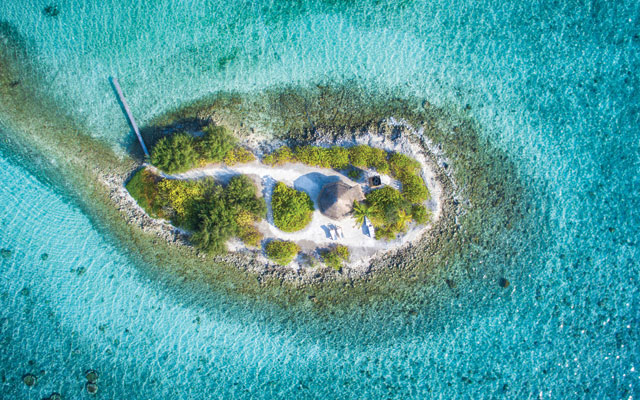Bells and whistles may define a new crop of resorts, but some hoteliers contend that barefoot luxury remains the Maldives’ strongest suit
New, innovative products are constantly appearing in Maldives’ hospitality scene, but seasoned hoteliers believe that barefoot luxury and unparalleled beauty remain the Maldives’ best product proposition and selling point.
But stiff competition means resorts in the Maldives are constantly trying to outdo each other. Ever since Conrad Maldives Rangali Island created the world’s first underwater restaurant 17 years ago, the island nation has seen numerous creative products – mostly underwater – such as spas, restaurants, and wine cellars. Recently, Conrad Maldives Rangali Island went a step further and unveiled the world’s first undersea villa.

Another new tourism product due for an early-2019 opening is Crossroads Maldives, a US$680 million resort by Thailand-based Singha Estate that comprises nine connected islands. The destination will include entertainment, shopping, restaurants and resorts by Hard Rock Café and Hilton.
Abdulla Ghiyas, president of the Maldives Association of Travel Agents, believes that the Maldives has always been at the forefront of innovative tourism attractions, and exciting products like Crossroads and Conrad’s undersea villa will take the destination to a whole new level.
However, both Sonu Shivdasani, founder and CEO of the Soneva hotel chain, said that such new products do not reflect the essence of the Maldives.
“Premium resorts will try new gimmicks. However, at the ultra-luxury level of the super rich and well-travelled urban elites, barefoot nature and the beauty of the Maldives is what they will seek. The more one can bring these guests closer to the actual beauty of the Maldives, the more successful one will be,” he remarked.
Andrew Ashmore, chief commercial officer at Coco Collection Hotels & Resorts, remarked that most resorts in the Maldives offer a similar product, with only a few exceptions that can be highlighted as unique.
“If you look at the newer properties like Movenpick, Fairmont, Westin, Raffles, JW Marriott, etc… they are all the same. All of these properties (pretty much 90 per cent), offer the same thing and look the same,” Ashmore noted.
To offer something different, the Coco chain has launched the nation’s first private island Coco Privé. The 1.4ha property costs US$45,000 a night, and features a master residence, five guest villas, purpose-built kitchen, cocktail bar, wine cellar, and is serviced by a team.
Ashmore added that the Chinese, the Maldives’ largest source market, visit the country for what it represents – islands, sea and resorts. Indians, a growing market of 5.5 per cent, are drawn by the romantic islands and good vegetarian food, not because of undersea attractions or shopping.
Access will also be made easier, with a new US$60 million UAE-funded international airport nearing completion on Maafaru island in Noonu Atoll. It is due to open in July 2019.
Suresh Dissanayake, Adaaran Resorts’ assistant vice president – sales & marketing, believes that while there still is a market for luxury products, differentiation is the key.
“Luxury can be anywhere in the Maldives. However, you will have to find your USP and position in order to sustain in the competitive environment,” he concluded.
Reinforcing this point, hospitality brand expert David Keen said that as many urbanites live in condos and apartments, they are willing to pay a high price to experience the simpler things in life such as walking along a beach barefoot.




















